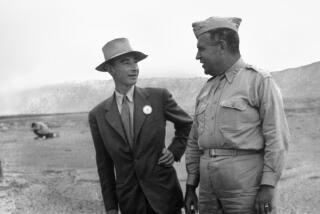The Feynman Legend
- Share via
Our community and the world are much poorer today for the loss of Richard Feynman, who until his death of cancer Monday night may have been the smartest person on Earth.
He was a most extraordinary man, a pure iconoclast who made enormous contributions to theoretical physics but who had unbridled curiosity about everything around him, which he pursued and mastered with skill and humor. To be with him was to get a glimpse of worlds that the rest of us could never enter.
As a teacher of physics at Caltech, Feynman was spellbinding. He inspired generations of students with the clarity of his thought and presentation. His “Lectures on Physics” continues to be a model of the explanation of complicated ideas. Two years ago, as a member of the President’s commission that investigated the explosion of the space shuttle Challenger, he demonstrated that talent to the nation when he showed how the rubber from the booster rocket’s seals became rigid when placed in ice water. It was pure Feynman: simple, direct and powerful.
The man reveled in demolishing the conventional. He abhored pomposity and self-importance, and resigned his membership in the National Academy of Sciences because, he said, most of what they did involved “choosing who was illustrious enough to be allowed to join us in our organization . . . . The whole thing was rotten because its purpose was mostly to decide who could have this honor.”
Feynman was never comfortable with the Nobel prize that he won in 1965 for developing the theory of quantum electrodynamics, the interaction of light and electrons, a theory that has been verified exactly by every experiment so far. The pleasure of the theory came from the theory itself, he said, and the Nobel prize was a burden that he could have done without. Some friends were not sure that he meant that, but he said it often and with the street-wise eloquence that was his trademark.
“The prize is the pleasure of finding the thing out,” he said, “the kick in the discovery, the observation of people using it. Those are the real things; the honors are unreal to me. I don’t believe in honors. It bothers me. My papa brought me up this way. I can’t stand it. It hurts me.”
A few years ago we told Feynman that we had enjoyed reading a book of his that had just come out. “Which one?” he asked. “Surely You’re Joking, Mr. Feynman,” we said, a delightful if selective autobiography of sorts. “Oh,” he said, “the joke book.” It was a joke book to be sure, a very funny collection of stories and reminiscences that showed him fixing radios as a child, cracking safes at Los Alamos while working on the Manhattan Project, hallucinating in a flotation tank, picking up showgirls in Las Vegas and winning a music prize with a local band in Brazil. He did all that and more. He excelled in whatever he turned his attention to. His contributions were legendary, and so was he.






